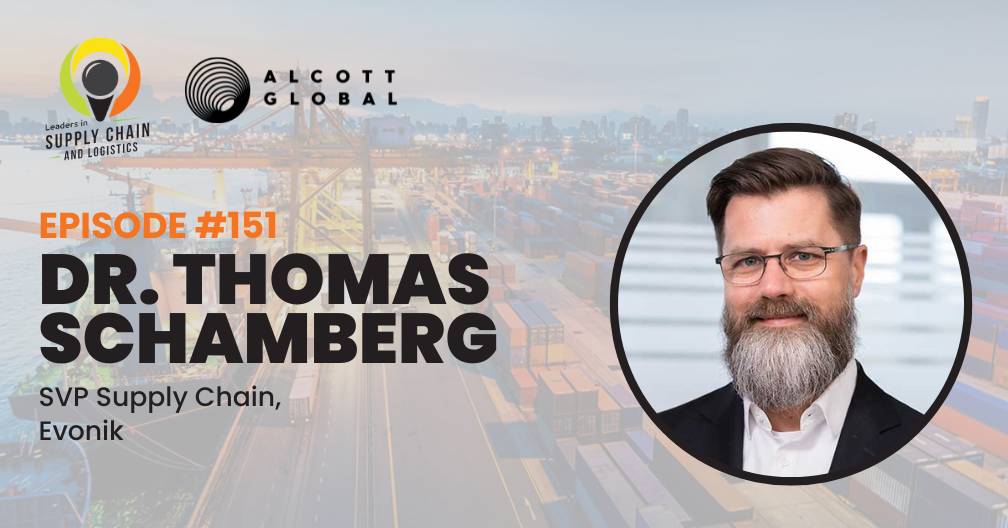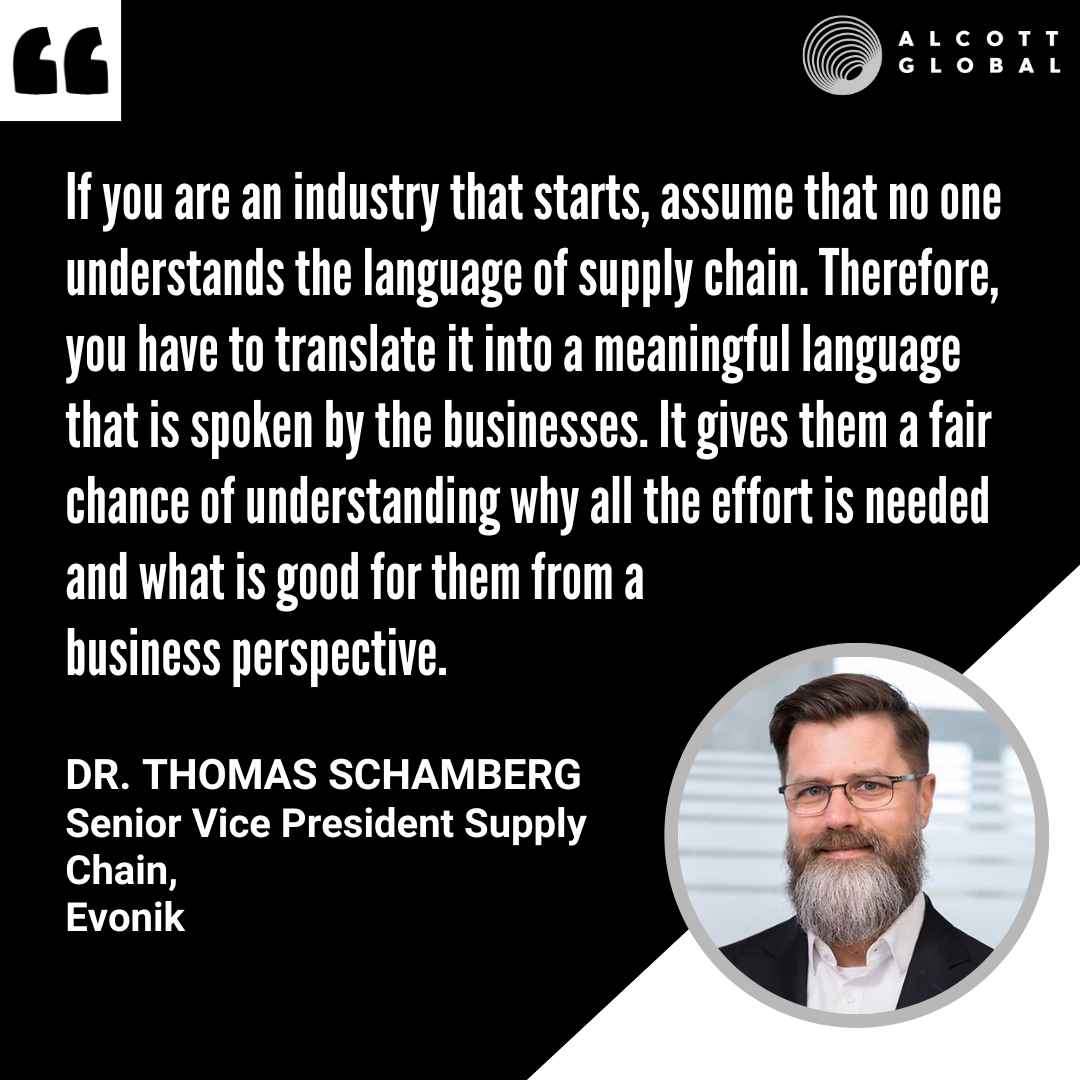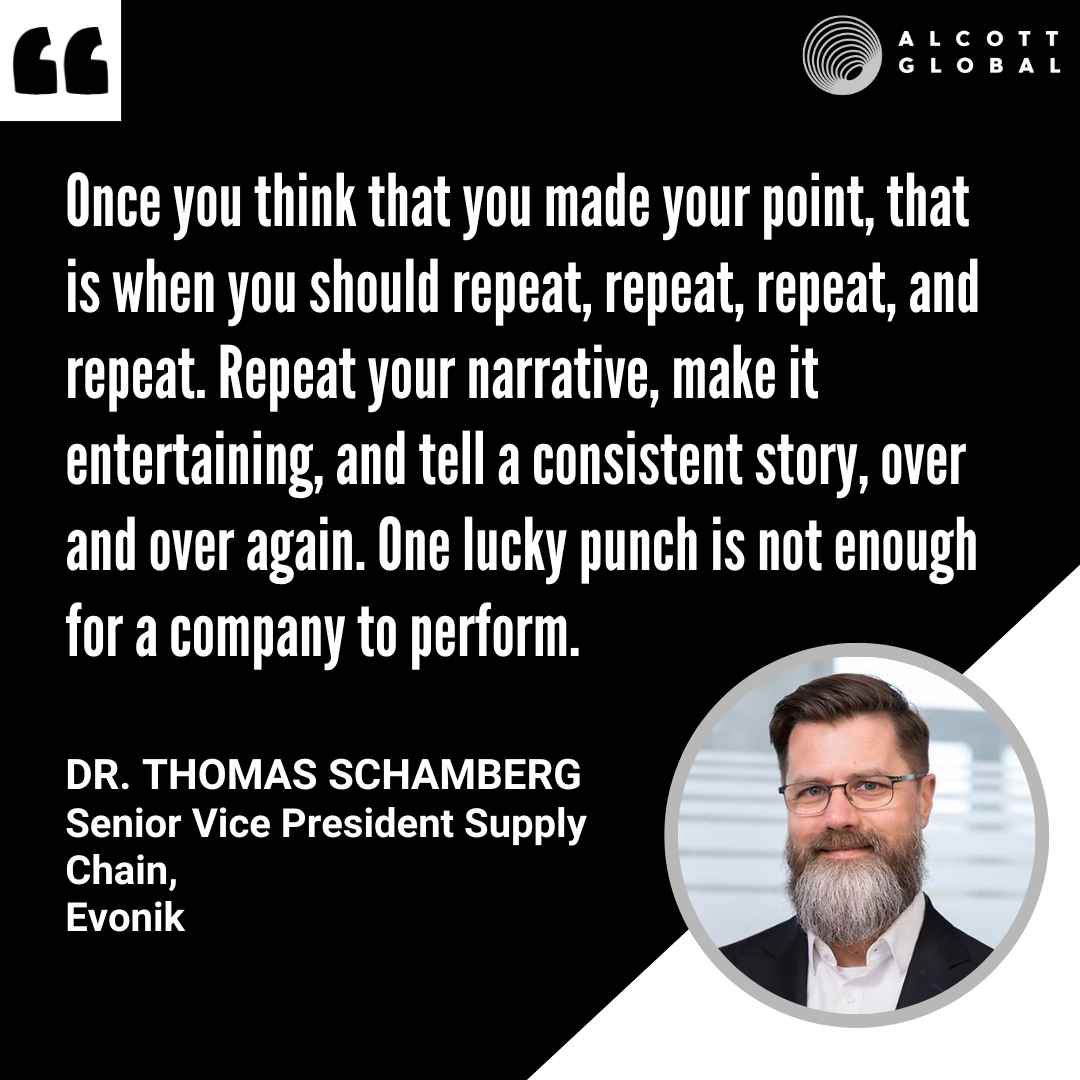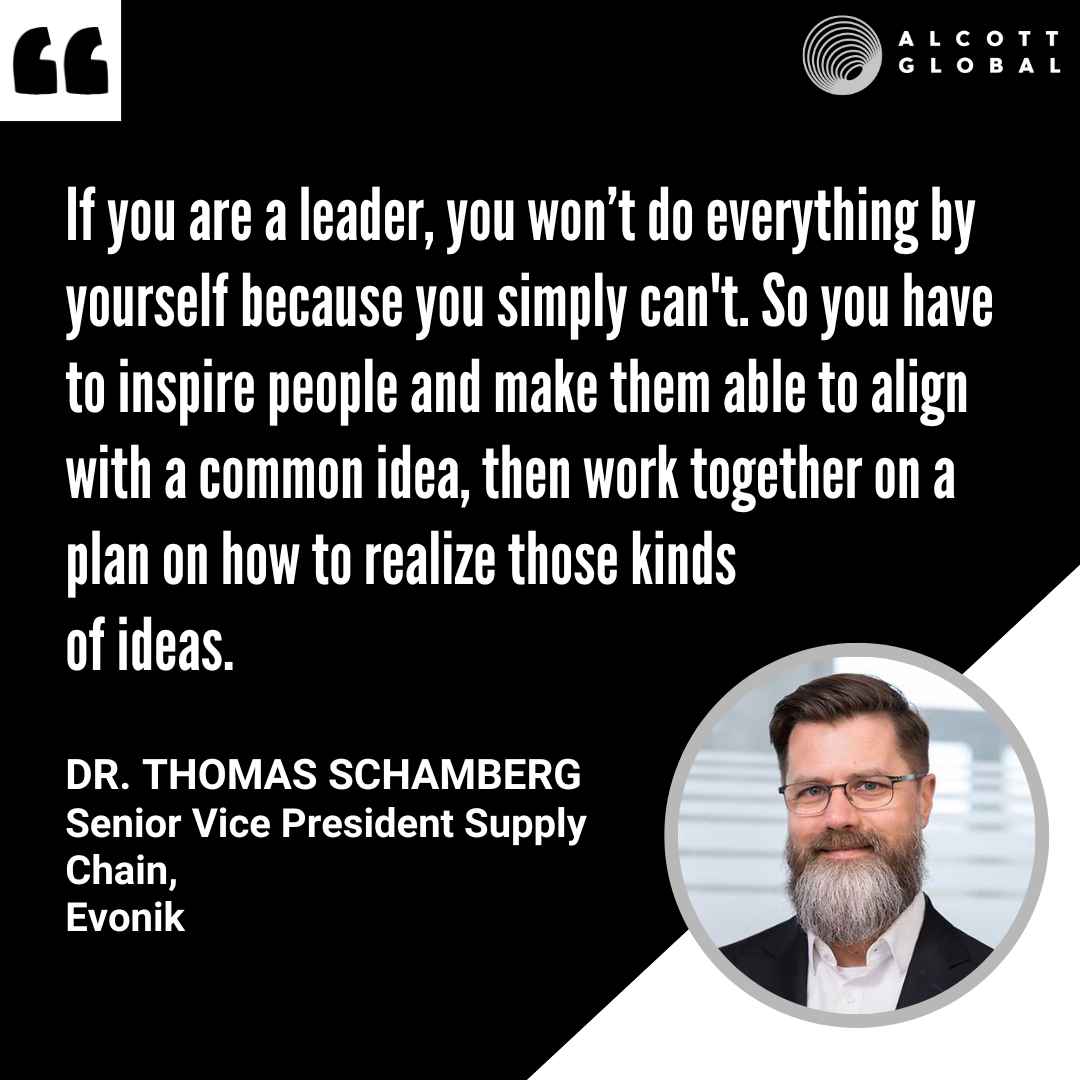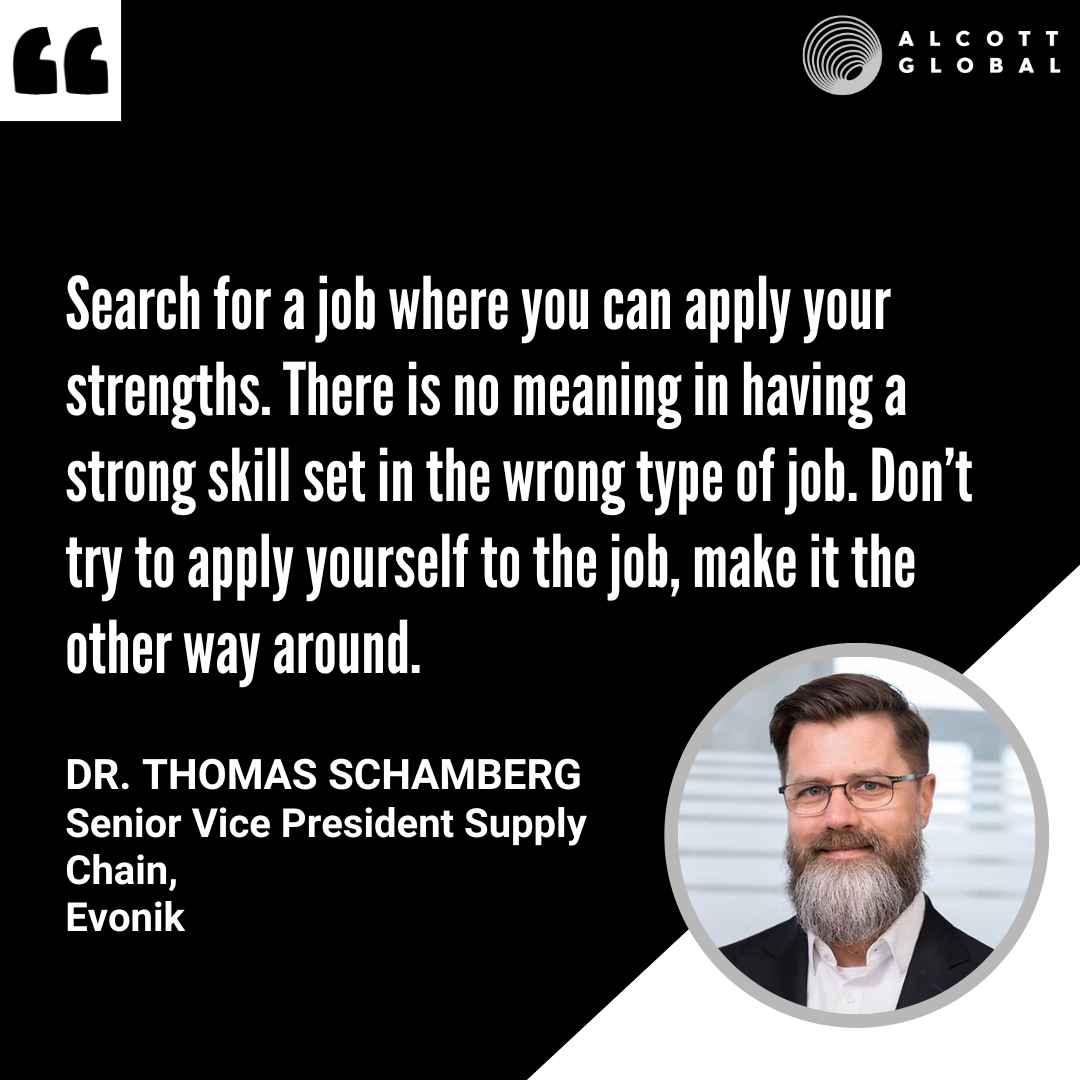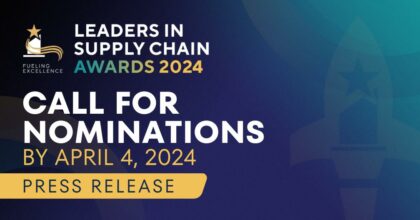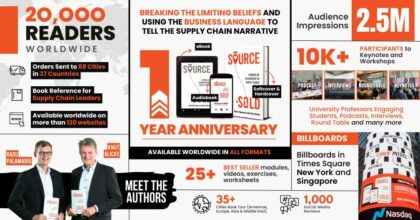Dr. Thomas Schamberg is the SVP Supply Chain at Evonik, one of the largest specialty chemicals groups in the world.
As a global lead, Thomas ensures consistency and excellence across the supply chain, overseeing standards, performance, and best practices. In his previous role as VP of Supply Chain Solutions, he led an in-house consulting team, delivering transformative results through the implementation of innovative solutions and operational efficiency improvements.
With a strong background in strategy, organizational development, and IT, he possesses a versatile skill set. Renowned for his analytical skills, strategic mindset, and ability to navigate complex challenges, he is committed to achieving exceptional outcomes. Colleagues have praised his leadership and talent for breaking down barriers.
Listen to the full discussion here:
Connect with the Guest:
Dr. Thomas Schamberg: LinkedIn
Some of the highlights from the podcast:
- Building an in-house consultancy group for supply chain management inside Evonik
- Principles to apply when going into new roles
- Story of the 20 seconds elevator pitch that led to the change in their supply chain structure
- Changing people’s mindset to think from an end-to-end perspective
- Is a fully autonomous supply chain possible?
- Constantly adapting skill sets on the journey
Show notes:
- [00:46] Tell us a little bit about the story of your career. How did you end up doing supply chain?
- [03:41] “I was asked, which is also my entry into the supply chain, to build up an in-house consultancy group for supply chain management.”
- [05:56] Are there certain patterns or certain principles you apply when you go into new roles that you’ve never dealt with before, that the audience can learn from?
- [07:07] “We have a saying, “How to eat an elephant?” And the answer is piece by piece. The question is how to define a structure that is eatable in a meaningful way. If you are a leader, you won’t do everything by yourself because you simply can’t. So you have to inspire people and make them able to align with a common idea, then work together on a plan on how to realize these kinds of ideas.”
- [08:25] Tell us a little bit about your journey for the last seven-eight years, from start to finish with a key question, how did you convince the board and your colleagues at that time to start the change?
- [09:12] “I met one of our board members, the CEO, in an elevator and I asked him if I can test an elevator pitch. We are already on the 19th floor and I had like 20 seconds but at the end, he held the door open for a moment longer and said, “Can you write me an email…”
- [13:20] “We are in the middle of a transformation and we are making progress step by step and piece by piece. It’s hard, but it’s also fun because we are getting better each and every day.”
- [14:02] What exactly did you tell the board for them to say something like, “You know what it’s worth going through the pain of change?”
- [16:21] “The Holy Grail of supply chain management in the chemical industry is planning. And it was very easy to explain what are the results of bad planning, of improper communication.”
- [17:56] “If you are an industry that starts, assume that no one understands the language of supply chain. Therefore, you have to translate it into a meaningful language that is spoken by your businesses. That’s very important because then they have a fair chance of understanding why all the effort is needed and what it is good for them from a business perspective.”
- [19:24] “Once you think that you succeeded, repeat, repeat, repeat, and repeat. Repeat your narrative, make it entertaining, and tell a consistent story, over and over again. One lucky punch is not enough for a company to perform.”
- [21:44] How did you change the mindset of the people that we’re not used to thinking end-to-end? What are some of the benefits that you got tangibly in Evonik?
- [23:31] “Networking capital is more than just inventory. But inventory is very easy to address. And here, we were able to bring more facts and figures into the discussion by not only knowing what kind of inventories we have but also knowing when we need combined planning and what kind of inventory we need.”
- [26:11] How do you see the impact of AI and all this machine learning and models specifically for supply chain? And are you already working, implementing, testing, or experimenting with some?
- [29:43] What would be one or two pieces of advice that have been most helpful to you in your career to make it to the executive level?
- [30:27] “Search for a job where you can apply your strengths. There is no meaning in having a strong skill set in the wrong type of job. Don’t try to apply yourself to the job, make it the other way around.”
Quotes from the Episode:
About the Host:
The host, Radu Palamariu is the co-author of “From Source to Sold – Stories of Leadership in Supply Chain”. He has been named one of the top 3 Global Supply Chain Influencers on LinkedIn and was featured in Forbes, Bloomberg, WEF, Bangkok Post, and MIT Supply Chain Talent magazine. Radu invites executives to share stories and perspectives around technology, logistics, e-commerce, supply chain, and manufacturing, and their views on how the future will look.
Alcott Global connects and upgrades the supply chain ecosystem by finding the right talent through executive search, developing talent through learning solutions, and meeting supply chain technology needs through a comprehensive crunch base marketplace.
The supply chain executive search has been our focus since the very beginning, offering recruitment services for top-tier supply chain roles at every level of the end-to-end supply chain: plan, source / procure, make, and deliver. Our consultants have years of experience in placing top talent, in North America, LATAM, Europe, the Middle East & Africa, and APAC, and besides speed, one of our biggest strengths is our network within the supply chain industry, and we capitalize on it to find the best solutions.
Through the years, we have grown as an organization and our offerings with it. One of our initiatives, the learning solutions- training and supply chain academy, is focused on transforming leadership- self-leadership, executive presence, influence capital, and business acumen. Through Supplify, we aim to match corporations with the top technology companies to solve their supply chain and logistics challenges with a focus on innovation and digital transformation.
We are in constant touch with the leaders in supply chain, inviting them to inspire the supply chain professionals in thought-provoking podcast episodes and events, and showcasing what is possible at the yearly Leaders in Supply Chain Awards.
Related Episodes:
#148: Hospitals and Supply Chain

